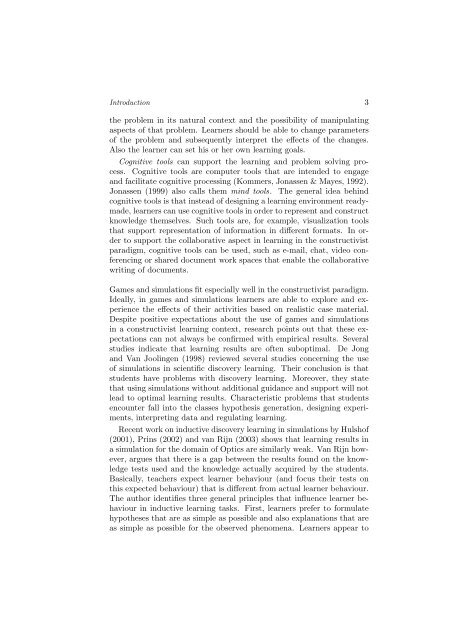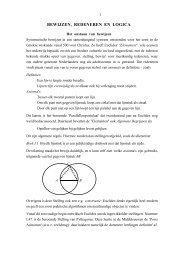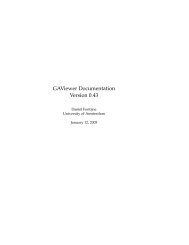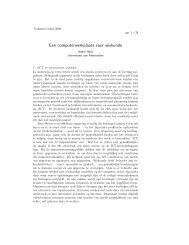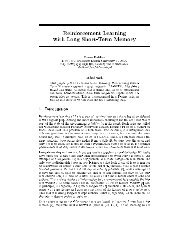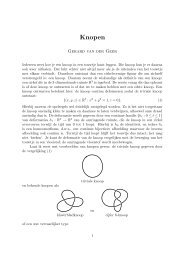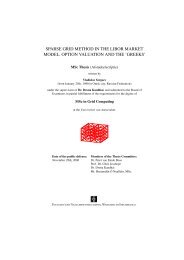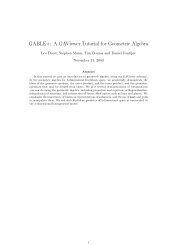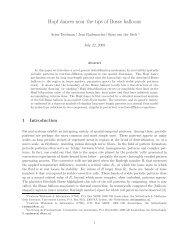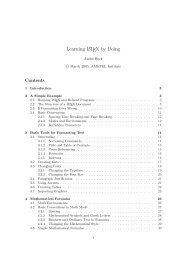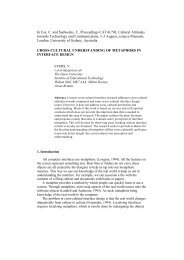The role of metacognitive skills in learning to solve problems
The role of metacognitive skills in learning to solve problems
The role of metacognitive skills in learning to solve problems
Create successful ePaper yourself
Turn your PDF publications into a flip-book with our unique Google optimized e-Paper software.
Introduction 3<br />
the problem <strong>in</strong> its natural context and the possibility <strong>of</strong> manipulat<strong>in</strong>g<br />
aspects <strong>of</strong> that problem. Learners should be able <strong>to</strong> change parameters<br />
<strong>of</strong> the problem and subsequently <strong>in</strong>terpret the effects <strong>of</strong> the changes.<br />
Also the learner can set his or her own learn<strong>in</strong>g goals.<br />
Cognitive <strong>to</strong>ols can support the learn<strong>in</strong>g and problem solv<strong>in</strong>g process.<br />
Cognitive <strong>to</strong>ols are computer <strong>to</strong>ols that are <strong>in</strong>tended <strong>to</strong> engage<br />
and facilitate cognitive process<strong>in</strong>g (Kommers, Jonassen & Mayes, 1992).<br />
Jonassen (1999) also calls them m<strong>in</strong>d <strong>to</strong>ols. <strong>The</strong> general idea beh<strong>in</strong>d<br />
cognitive <strong>to</strong>ols is that <strong>in</strong>stead <strong>of</strong> design<strong>in</strong>g a learn<strong>in</strong>g environment readymade,<br />
learners can use cognitive <strong>to</strong>ols <strong>in</strong> order <strong>to</strong> represent and construct<br />
knowledge themselves. Such <strong>to</strong>ols are, for example, visualization <strong>to</strong>ols<br />
that support representation <strong>of</strong> <strong>in</strong>formation <strong>in</strong> different formats. In order<br />
<strong>to</strong> support the collaborative aspect <strong>in</strong> learn<strong>in</strong>g <strong>in</strong> the constructivist<br />
paradigm, cognitive <strong>to</strong>ols can be used, such as e-mail, chat, video conferenc<strong>in</strong>g<br />
or shared document work spaces that enable the collaborative<br />
writ<strong>in</strong>g <strong>of</strong> documents.<br />
Games and simulations fit especially well <strong>in</strong> the constructivist paradigm.<br />
Ideally, <strong>in</strong> games and simulations learners are able <strong>to</strong> explore and experience<br />
the effects <strong>of</strong> their activities based on realistic case material.<br />
Despite positive expectations about the use <strong>of</strong> games and simulations<br />
<strong>in</strong> a constructivist learn<strong>in</strong>g context, research po<strong>in</strong>ts out that these expectations<br />
can not always be confirmed with empirical results. Several<br />
studies <strong>in</strong>dicate that learn<strong>in</strong>g results are <strong>of</strong>ten suboptimal. De Jong<br />
and Van Jool<strong>in</strong>gen (1998) reviewed several studies concern<strong>in</strong>g the use<br />
<strong>of</strong> simulations <strong>in</strong> scientific discovery learn<strong>in</strong>g. <strong>The</strong>ir conclusion is that<br />
students have <strong>problems</strong> with discovery learn<strong>in</strong>g. Moreover, they state<br />
that us<strong>in</strong>g simulations without additional guidance and support will not<br />
lead <strong>to</strong> optimal learn<strong>in</strong>g results. Characteristic <strong>problems</strong> that students<br />
encounter fall <strong>in</strong><strong>to</strong> the classes hypothesis generation, design<strong>in</strong>g experiments,<br />
<strong>in</strong>terpret<strong>in</strong>g data and regulat<strong>in</strong>g learn<strong>in</strong>g.<br />
Recent work on <strong>in</strong>ductive discovery learn<strong>in</strong>g <strong>in</strong> simulations by Hulsh<strong>of</strong><br />
(2001), Pr<strong>in</strong>s (2002) and van Rijn (2003) shows that learn<strong>in</strong>g results <strong>in</strong><br />
a simulation for the doma<strong>in</strong> <strong>of</strong> Optics are similarly weak. Van Rijn however,<br />
argues that there is a gap between the results found on the knowledge<br />
tests used and the knowledge actually acquired by the students.<br />
Basically, teachers expect learner behaviour (and focus their tests on<br />
this expected behaviour) that is different from actual learner behaviour.<br />
<strong>The</strong> author identifies three general pr<strong>in</strong>ciples that <strong>in</strong>fluence learner behaviour<br />
<strong>in</strong> <strong>in</strong>ductive learn<strong>in</strong>g tasks. First, learners prefer <strong>to</strong> formulate<br />
hypotheses that are as simple as possible and also explanations that are<br />
as simple as possible for the observed phenomena. Learners appear <strong>to</strong>


